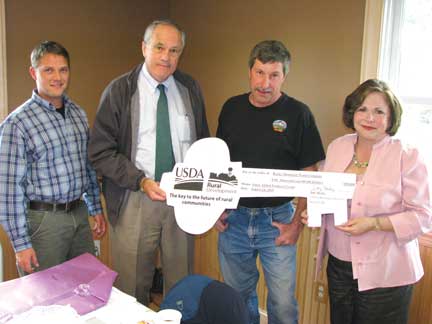Rocky Mountain Wood Co. To Create Renewable Energy Business

(left to right) Rocky Mountain Lumber Company Forester John Clark, Jay Healey, the state director of the USDA's Rural Development Program, Rocky Mountain Lumber Company President John Burson and State Sen. Gale Candaras met last week to discuss the $50,000 federal development grant the company was awarded.
Reminder Publications photo by G. Michael Dobbs
WILBRAHAM -- The owner of Rocky Mountain Wood Co. on Boston Road will use a $50,000 federal planning grant from the United States Department of Agriculture (USDA) to help create a renewable energy business.
Rocky Mountain Wood Co. President John Burson explained to Jay Healey, the state director of the USDA's Rural Development Program and State Sen. Gale Candaras last week at a meeting, there is a supply of materials to manufacture wood fuel pellets locally as well as a potential customer base. The USDA Value-Added Producer Grant will fund a feasibility study and Burson said. the study should be done by the end of December and he intends to move forward quickly.
"There is no better time than now to build," he said.
Burson's business already sells bark mulch, wood chips and firewood and has been in operation for 30 years. He said a pellet operation would help local landowners developed a market for low-grade trees and "weed trees."
Besides manufacturing pellets, Burson would also produce wood shavings. Since there are no longer many sawmills in the region, wood shavings, used for bedding horses, actually are brought into the state, he said.
The pellet facility would be built on the company's property near the Chicopee River in an area already zoned for industry, he added.
Landowners who manage forests have to ship wood for pellets to companies in New Hampshire and Canada. The shipping costs eat into the profits and trucking the wood hundreds of miles creates a larger carbon footprint, Burson said.
Healey, who is a forester in Franklin County, said Massachusetts is one of the most forested states in the country and has five times more "junk wood" than can be harvested.
Burson said that because the wood pellets are condensed and dried they do not create the ash or the smoke associated with fire wood. The pellet stoves are considered so safe they can be installed in a home with a vent through an exterior wall and do not require a chimney.
Both men told Candaras their industry could benefit from the Green Communities Act passed in 2008 that promotes lower energy costs and makes it possible for people who generate their own electricity to sell their excess to utility companies.
Healey sees an even larger application for the pellets in biomass cogeneration facilities. He asserted the state has "misplayed" the development of biomass by encouraging large operations that merely generate electricity. He believes smaller biomass units that generate electricity and use the heat to warm buildings would spur considerable economic development.
Healey said that countries such as the Netherlands and Austria are using sophisticated biomass cogeneration plants to heat schools and other municipal buildings.
Burson said local schools should consider this kind of fuel and Candaras said there are three schools being built in her senatorial district and she would look into the idea.
This is also listed in these categories...

